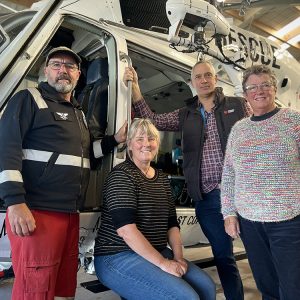The Trust Tairāwhiti Eastland Rescue Helicopter can (and does) fly in the rain but low cloud or persistent fog can keep it grounded.
That was what happened nearly a year ago when Tokomaru Bay couple Rob And Anne MacKenzie called for help when Anne suffered a medical event.
The rescue helicopter team could not get to them and because they still had no way out after Cyclone Gabrielle wiped out the Pauariki Bridge on Hikuwai Road, they could not get out.
And that’s why they are members of the Bridging Tairāwhiti group, founded to advocate for families who still have no bridge access to their homes.
On the July day the couple called 111 the river was up to about five metres, too high to risk a ford crossing.
“Anne had fainted and, because it had happened before, I really wanted to get medical help so they could see what was causing the problem,” Rob says.
“The local ambulance could not get through and because the weather was really clagged up, neither could the helicopter.
“The helicopter team came the next morning as soon as the weather cleared and gave Anne a good once-over, which was very reassuring. But at the time it was pretty frightening and reminded us of just how vulnerable we are.”
As a volunteer firefighter Rob is familiar with the Eastland Rescue Helicopter, even more so after the team dropped in to his property to deliver supplies and do welfare checks in the wake of Cyclone Gabrielle.
But when Bridging Tairāwhiti last week met at the Eastland Helicopter Trust Rescue hangar to share their concerns and to brush up on first aid techniques specific to rural environments, the MacKenzies could not be there.
Group facilitators Sarah Telford and Jan Crawford say that, after a couple of days of rain, rising river levels again left the couple stranded.
“It’s a shame they could not come but is a timely reminder of why were are doing this work,” says Sarah.
“They are one of at least four Tairāwhiti families who often still can’t get off their properties and who, after all this time, feel they have been forgotten.
“They have been told it could be years before they get any relief.”
Being invited to meet at the hangar was “a gift”, she says.
“As well as making us all feel supported and welcome, it was a chance for our members to meet the lovely rescue helicopter team and learn about the service.
“It is scary enough being cut off in an emergency, so being familiar with the process and knowing what to expect is very reassuring.”
During the meeting the group worked with Practical Training Solutions instructor Tony Giles to learn skills from managing shock and stabilising injuries to carrying out cardiopulmonary resuscitation.
“The main difference with first aid in a rural setting is that if you are on-scene, you might have to care for the patient for some time,” Tony says.
His two top tips are:
– Make good use of what you have from blankets and insulation tape to car sun visors (to keep an injured person off the cold ground);
– If you can, use the patient’s phone to call 111 (the phone doesn’t need to be unlocked) so your own phone is free to call for help from anyone close by (like farm neighbours).
And as Eastland Rescue Helicopter pilot Tony Brice points out, in an emergency a Personal Locator Beacon could be your best friend.
Gisborne District Council Mayor Rehette Stoltz and director of community lifelines Tim Barry were on hand to hear the group’s concerns, and to themselves brush up on their first aid skills.
“That was important as members of this group often feel they are not being heard,” Sarah says. “Obviously Rehette and Tim could not promise anything on the day, but their presence was appreciated.”
Bridging Tairāwhiti members live in locations from the East Coast to Whatatutu and Pehiri and because their properties had not been red- or yellow-stickered, they felt they had fallen through the cracks.
“It’s a unique position to be in which means it is not just physically isolating, it is mentally isolating as well,” Rob MacKenzie says.
“Being part of this group means we can share our experiences and our fears, a big one being around how everything we do is dependant on us keeping ourselves in one piece mentally, physically and emotionally.
“If one of us gets sick or hurt, everything can change in a moment.”
CAPTION: As part of the Bridging Tairāwhiti meeting, Trust Tairāwhiti Eastland Rescue Helicopter pilot Tony Brice (left) helped guests including group facilitators Jan Crawford (right) and Sarah Telford, and GDC director of community lifelines Tim Barry, get familiar with the workings of the team’s BK-117 helicopter.
